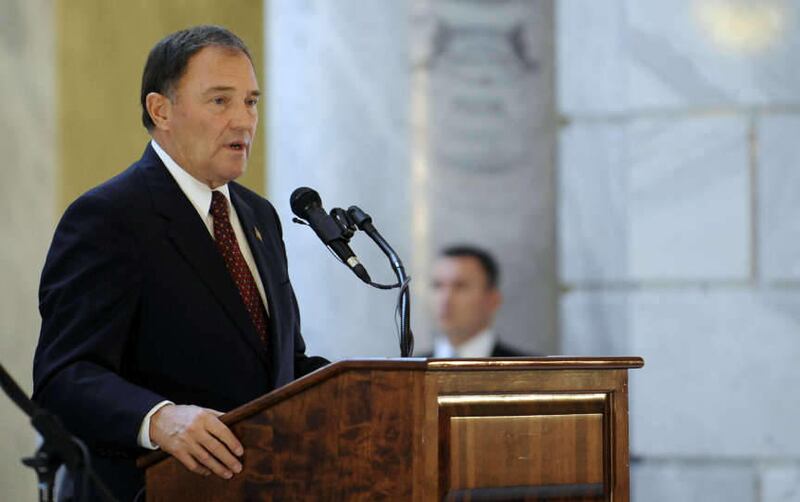SALT LAKE CITY — Gov. Gary Herbert said Thursday that decisions by elected leaders in other states to not enforce laws banning same-sex marriages are "the next step to dictatorship" and pledged to defend Utah's Amendment 3.
The governor also announced that he has decided "doing nothing" about the Medicaid expansion available under the Affordable Care Act is no longer an option and said a plan will be put in place during the 2014 Legislature.
But while Herbert said something needs to be done to help the estimated 60,000 impoverished Utahns who currently have no health care options, he's not ready to divulge details.
"Stay tuned," the governor told reporters after the taping of his monthly news conference on KUED Channel 7. "What that something is, I've got to make sure we bring consensus to the Legislature."
His comments on same-sex marriage came the same day as new Virginia Attorney General Mark Herring sought to invalidate Virginia's voter-approved constitutional amendment defining marriage as between a man and a woman.
Herbert said he was not picking on anyone specifically, but mentioned both Virginia's and California's unwillingness to defend the voter approved definition of marriage as between a man and a woman.
"I think that's on very dangerous, in fact, footing when we have elected officials picking and choosing which laws they're going to enforce that have been given to them by the people," Utah's governor said.
"I think that's wrong. That's dangerous. That's the next step to dictatorship," he said. "We're not going to do that in Utah. The will of the people, we've heard them speak. There's been debate on it. And we're going to follow the rule of law wherever it takes us."
Utah voters added Amendment 3 to the state Constitution in 2004 to define marriage as between a man and a woman and also to bar recognition of any other type of domestic union.
In his first extensive interview on the Dec. 20 decision by a federal judge to strike down Amendment 3, the governor said he had empathy for the gay and lesbian couples married before the U.S. Supreme Court issued a stay.
"I have empathy for their plight. I have empathy for their joy and the confusion that's been created," Herbert said.
After the stay was issued, his office said the state could not legally recognize the more than 1,000 same-sex newlyweds.
The ruling by U.S. District Judge Robert Shelby caught him off guard, the governor said. At the time, he said he was interviewing candidates for attorney general to fill the vacancy left by John Swallow's resignation.
"I don't know if shock is the right term, but I certainly was surprised," Herbert said. "I do not think it was appropriate for Judge Shelby to make that decision in the way he did."
But the governor said the judge's decision, which came just before the Christmas holiday and did not include a stay, is still an opportunity to reflect on the question of how to treat same-sex couples.
Asked about civil unions, Herbert said while that's prohibited under Amendment 3, "if there are other ways to get from here to there that can be the common ground approach and find that proverbial win-win, let's take a look at it."
He said the people involved in gay relationships "are loving each other. They are taking care of each other, just like people in other families and traditional families are doing. It's been working. Can we improve? I guess that's part of the debate."
That debate, Herbert said, must be civil on all sides of the issue.
Members of the gay community, the governor said, are "our neighbors, our friends, our relatives. They deserve our respect. We should be kind and courteous. We should make sure that this issue, although controversial, is not contentious."
Herbert praised new Attorney General Sean Reyes' choice of Gene Schaerr as the lead outside counsel on the state's appeal to the 10th Circuit Court of Appeals and likely the Supreme Court.
Schaerr, who left a partnership in a Washington, D.C., law firm to take the case, agreed to cap his legal fees for the 10th Circuit appeal at $200,000 and accepted a position as a fellow at the Sutherland Institute.
The head of the conservative think tank, Paul Mero, had offered to pay the state's legal costs as long as he approved of the attorney selected and the legal strategy.
Mero declined Thursday to say how much Sutherland is paying Schaerr under contract to produce papers over the next six months on defending traditional marriage.
Asked about the institute's potential influence on the case, the governor said the question that should be raised is whether the state hired a good attorney.
Schaerr, he said, "has impeccable credentials."
Email: lisa@deseretnews.com
Twitter: DNewsPolitics


